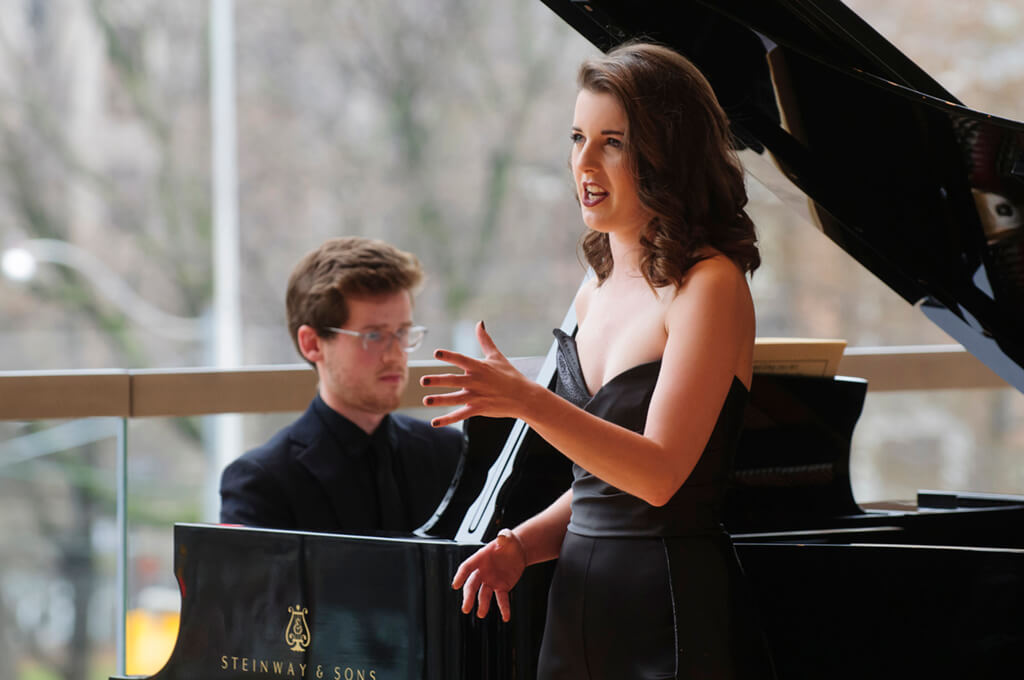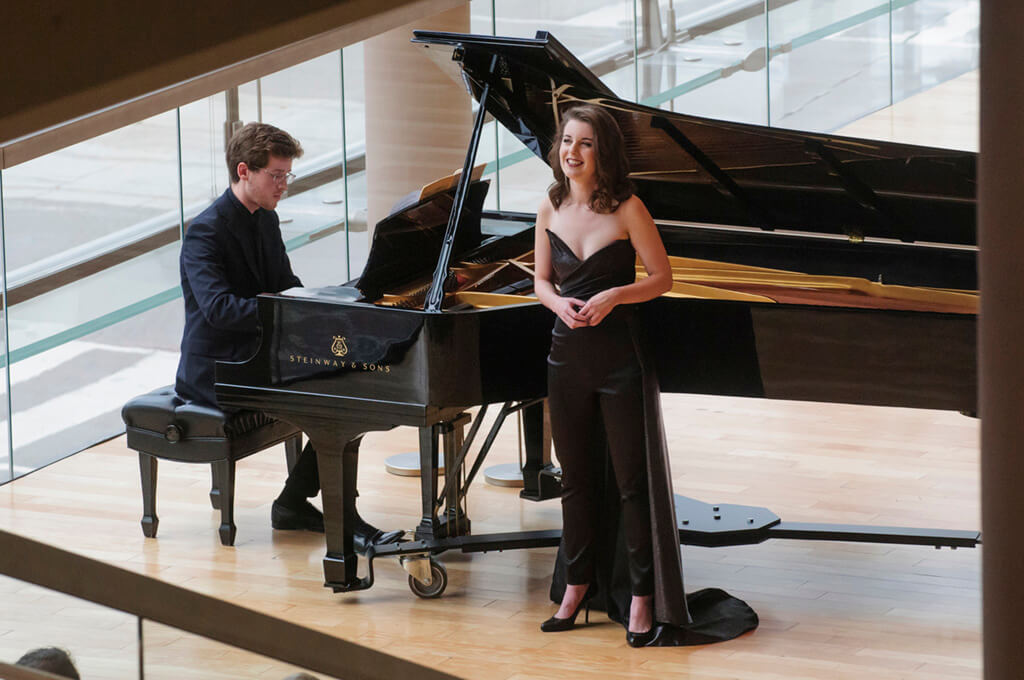
Grieg: Sechs Lieder, Op. 48; Poulenc: Banalités; Berg: Sieben frühe Lieder; Bridge: Four Songs. Simone McIntosh, mezzo-soprano; Stéphane Mayer, piano. Richard Bradshaw Amphitheatre, Four Seasons Centre, 12 p.m. December 5, 2017.
Of the current crop of fresh young Canadian classical voices, mezzo Simone McIntosh has that rare quality that makes the listener sit up and take notice. She combines a beautiful, well focused, gleaming high mezzo with an innate theatricality that bodes well for the future.
I heard her for the first time about two years ago in a masterclass, if memory serves. On the program was “Nacht” from Berg’s Sieben frühe Lieder. Not only did she sing this difficult song very nicely, I recall that she wore a striking Klimt-inspired necklace, perfect for the Expressionist piece. How many voice students can one expect to have such a sophisticated sense of style, and a top-class voice?
Fast forward to November 2016, McIntosh won the COC Ensemble Studio Competition, which earned her a spot on the roster for the current season. To top it off, she also won the Wirth Vocal Prize from her alma mater, McGill University. Today’s noon hour concert was the result of the Wirth Prize win. With Elizabeth Wirth and other dignitaries from McGill in attendance, and with COC Ensemble Studio colleague Stephane Mayer at the piano, McIntosh gave a scintillating recital of songs by Edvard Grieg, Francis Poulenc, Alban Berg, and Frank Bridge.
True to her reputation as having a stylish stage persona, McIntosh appeared in a knockout black pantsuit, with a dramatic train, created by renowned Canadian fashionista Rosemarie Umetsu, who was in the audience. McIntosh started with Sech Lieder Op. 48 by Grieg. Composed in 1889, these songs are ruminations of love, life, and nature. The last song, “Ein Traum” is the biggest and the most popular of the cycle, almost operatic in scope. McIntosh’s voice bloomed beautifully here. Her instrument, while not huge, has a lively though not excessive vibrato. More importantly, it has what the Italians call squillo or “ping” allowing it carry beautifully in a big house. An auspicious start to the program.

This was followed by a change of style, to the alternately languid and quick-silver Banalités by Poulenc. This composer’s musical idiom is uniquely his. Listening to these songs, I feel like I heard snatches of Les dialogues des Carmélites with its measured cadence and unique piano writing. The second song, “Hôtel,” you can almost smell the cigarette smoke! If I were to nitpick, stylistically McIntosh needs a bit more variation in tone colours from the German songs, and a bit more playfulness in delivery in the Poulenc. That said, it was still lovely, particularly a vivid “Voyage à Paris.”
The third group was Sieben frühe Lieder (1905-08) by Alban Berg. If you hate 12-tone or are allergic to Alban Berg – you have nothing to fear with these songs! While he was already a student of Schönberg at the time, he composed these songs in a very accessible, melodically inspired style. Sure, he pushes the borders of the already expanded tonality of the late Romantics, but it’s tonally “resolved” at the end of each song. The tessitura of these songs is quite low except for a couple of A naturals in “Die Nachtigall.” It’s suitable for a low soprano or a high mezzo with an easy top. McIntosh sang these very beautifully, just an occasional tentative moment between the pianist and singer here and there notwithstanding. The piano accompaniment is very demanding, particularly the last two songs, “Liebesode” and “Sommertage.” Pianist Stéphane Mayer paced well and was fully up to the technical demands of these pieces.
The recital concluded with four songs by Frank Bridge (1879-1941). The British composer seems to be undergoing a resurgence of sorts, with quite a few commercial recordings of his songs and plenty of live performances on Youtube. His “Love went a-riding” is particularly popular, often found on recital programs. McIntosh delivered it in bright, buoyant tone and exuberant spirit, beautifully matched by the playing of Mayer. The enthusiastic audience gave the two artists a generous ovation.
We Toronto opera fans are fortunate that we get to hear these artists at the beginning of their careers. These two have great futures ahead of them. In the meantime, be sure to catch their upcoming performances at the COC, especially the Ensemble Showcase on May 25, 2018.
#LUDWIGVAN
Want more updates on Toronto-centric classical music news and reviews before anyone else finds out? Follow us on Facebook or Twitter for all the latest.
![]()



